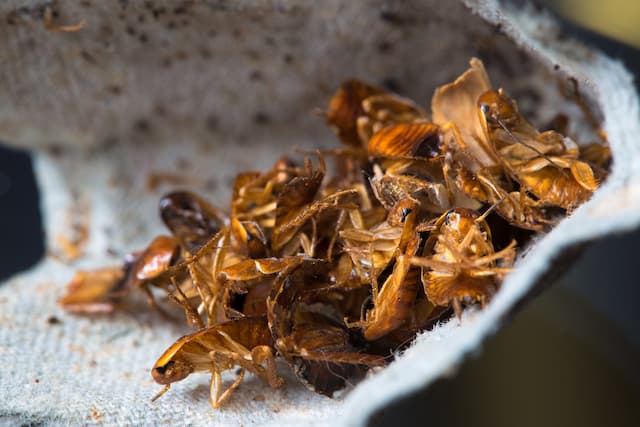Cockroaches are tough pests that can give you the creeps. Their life cycle is both interesting and important to know about in order to control and prevent them. You can better get rid of these annoying house guests if you know about their life stages. Let’s look into the life cycle of a cockroach.
- The egg stage: Cockroaches start their lives as eggs. Ouchecae are secure cases that female cockroaches make for their eggs. They can hold dozens of eggs. Each species of cockroach has a different amount of eggs in its ootheca. The ootheca is usually hidden in cracks, crevices, or other secret places, which makes it hard to find and get rid of. It could be anywhere from a few weeks to a few months before the eggs hatch.
- The Nymph Stage: Nymphs are the young cockroaches that come out when the eggs hatch. Nymphs don’t have wings, but they look like little bugs that are bigger than they are. As they get bigger, they lose their exoskeletons and keep moving around. Nymphs go through several moults. Each stage in between moults is called an instar. Cockroaches are very fragile as nymphs and need food, water, and a place to hide to stay alive and grow.
- The adult stage: The nymphs transition to the adult stage when they are fully grown. Cockroaches that are adults have fully grown wings and can have babies. How long it takes for a nymph to grow up depends on things like the species, the temperature, and the amount of food that is available. Different kinds of cockroaches can live for a few months to a few years as adults.
Reproduction and Length of Life
Cockroaches have a lot of babies. One female cockroach can have many offspring over the course of her life, which can cause a big problem if it isn’t managed. They are very hard to control because they can reproduce quickly and are tough.
Why it’s Important to Know About the Life Cycle
To get rid of cockroaches effectively, you need to know how they live:
- Identification: Being able to tell the difference between cockroach eggs, nymphs, and adults is very important for figuring out the stage of an invasion.
- Control: A more thorough method to control is possible when you look at the whole life cycle. Even though you need to kill adult cockroaches, you also need to deal with their eggs and young. If you only focus on adults, you might end up with ongoing outbreaks.
- Prevention: If you know where cockroaches lay their eggs, you can look for places where they might be growing. Stopping people from getting to these places is a key part of keeping outbreaks from happening.
- Timing: Knowing the life cycle helps you figure out the best times to take control measures. For example, getting rid of cockroaches when they are still nymphs may be more effective than waiting until they become adults.
Control Strategies That Work
To get rid of cockroaches successfully, you need to take more than one step:
- Sanitation: Keep the area clean to get rid of sources of food and drink. Put food in containers that won’t let air in, and fix any water leaks.
- Sealing: Fill in holes, crevices, and other possible entry points to make your home less appealing to cockroaches as a place to hide.
- Feeders and Traps: You can catch both adults and young cockroaches with feeders and traps. These can be very good at lowering numbers.
- Professional Pest Control: If there are a lot of cockroaches or certain species, you may need to hire professional pest control services for a more complete and effective answer.
To sum up, it’s important to understand the cockroach life cycle in order to control and avoid them. To get rid of them from your home, you can be proactive and learn about their different stages and where they hide their eggs. In order to get rid of these tough pests for good, you need to take a mix of good hygiene, sealing off entry points, and targeted pest control measures.
Professional Cockroach Exterminator in Bolton. Whether the cockroach problem is new, or it has been ongoing for some time our team can and will put an end to it. Call now and book a treatment: 647-578-7949.
